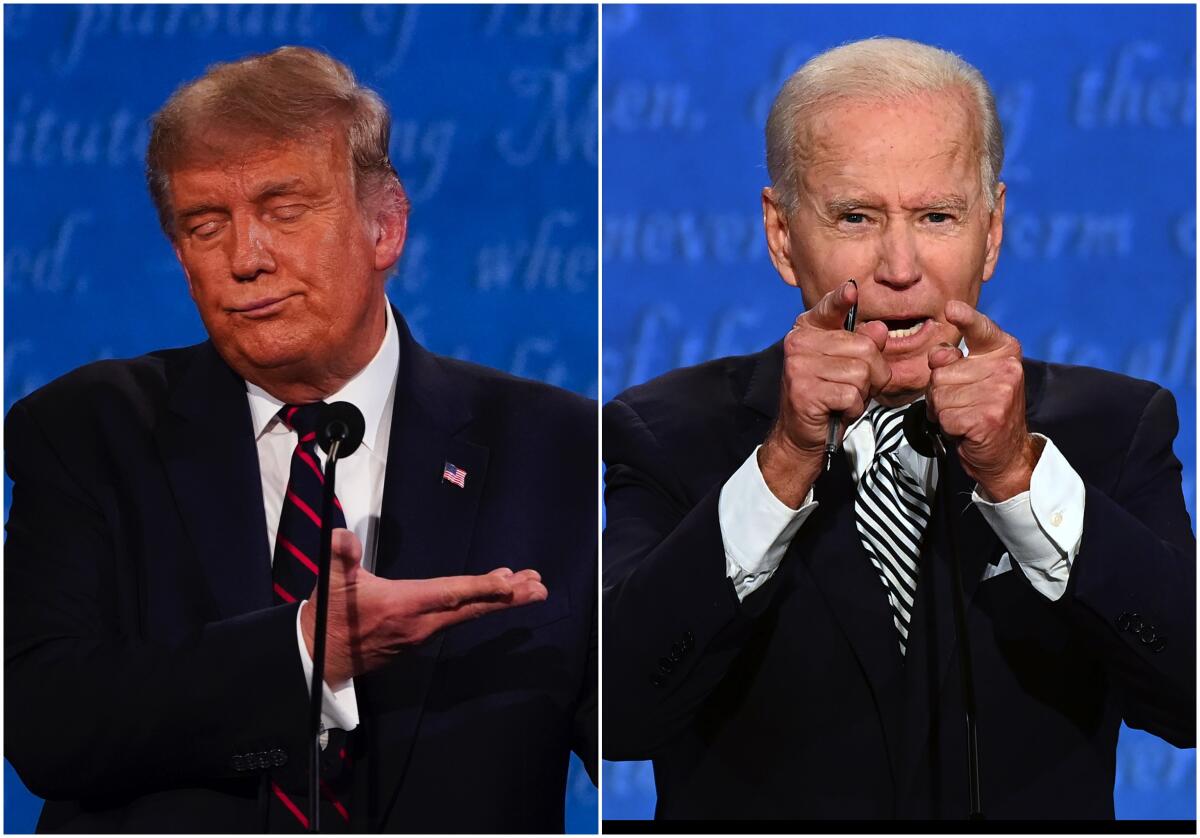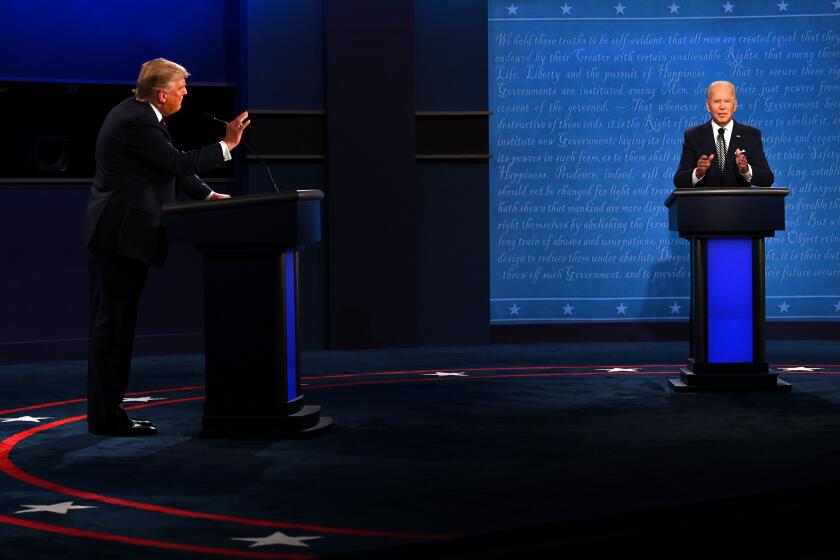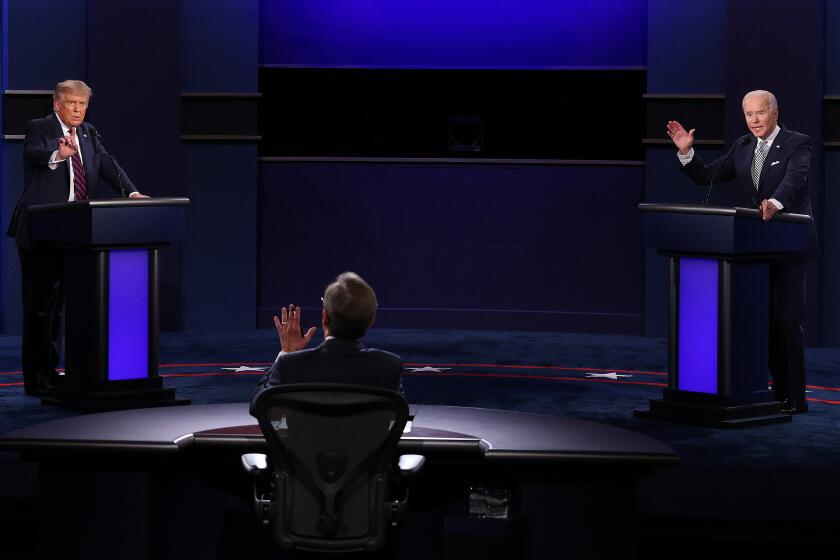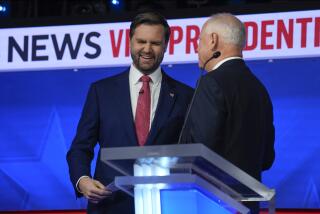Column: Presidential debates worked a lot better when women called the shots

Oh, League of Women Voters, please accept this nation’s most humble apology for ever doubting you and take the presidential debates back.
Last night, as our “law and order” president ignored even the most generous notions of law and order regarding public debate — Guess what? You actually have to let your opponent talk! Without interrupting to call him stupid! — many noted that what we needed was not a moderator but a mom. Someone who, accustomed to dealing with the “it wasn’t me, it was him” bluster so popular among 7-year-olds, could have shut down President Donald Trump’s beloved strategy of disrupt-and-deflect with the proper level of sternness.
Certainly, Chris Wallace was not up to the task; his interjections simply allowed Trump to suck him into his preferred method of communication: non sequitur anarchy. Former Vice President Joe Biden attempted to engage in what could reasonably pass for debate on the issues — but with Wallace unable to establish a tone of even occasional decorum, the Democratic contender too succumbed to the scrum.
Unlike many others, I cannot bring myself to blame Wallace. Attempts to keep Trump from interrupting were in vain, and short of shouting or verbally threatening the president of the United States, there was little the putative moderator could do except attempt to interrupt the interruptions.
While viewers took to social media calling for Trump’s mic to be cut during Biden’s allotted time, Wallace was essentially powerless. I think the Fox News anchor spoke for many when he said later “I’ve never been through anything like this.”
No, the failure lies not with Wallace but with the Commission on Presidential Debates, or rather the series of events that led to its creation in the first place. There’s a good reason so many Cleveland mothers were offering to drive over to Case Western Reserve University and take Wallace’s seat mid-debate: In the early years of the debates, women did run the show, until the candidates decided not to respect their rules.
Tuesday’s debate between Trump and Biden could have used a mom -- someone who knows how to exert some discipline over a heedless child.
In 1976, the League of Women Voters sponsored the televised debate between President Gerald Ford and Democratic nominee Jimmy Carter, the first such event since John F. Kennedy and Richard Nixon had launched the format in 1960. (Tellingly, Nixon and President Lyndon Johnson had subsequently refused requests to participate in televised face-offs.) Almost 70 million Americans watched.
LWV wanted to create one space where voters could see the candidates outside the partisan context of conventions, rallies and ads, where candidates would have to answer substantive questions about their plans for governance without the distractions of roaring crowds and hecklers.
To ensure this, the nonpartisan group initially refused input from the candidates or their representatives. LWV chose the topics and the debate panelists and created a structure based on ensuring equal time for each candidate. Keeping control of the event was not an easy task. In 1980, President Jimmy Carter argued that Independent John Anderson should not be given a platform in what the Democratic incumbent believed should be a debate with only Republican nominee Ronald Reagan. The LWV held firm. Reagan and Anderson debated without Carter, and Reagan won the election.
In 1984, the campaigns of President Reagan and Democratic nominee Walter Mondale succeed in rejecting 100 proposed debate panelists before agreeing upon journalists who suited them both. Four years later, the campaigns of Vice President George H.W. Bush and Democratic nominee Michael Dukakis came up with their own set of rules, which included who would be allowed to sit in the audience and the abolishment of follow-up questions. Presented with this 16-page document, the LWV said withdrew its sponsorship of the debates. In a stinging press release, the group’s then-president Nancy M. Neuman said that “the demands of the two campaign organizations would perpetrate a fraud on the American voter.”
“It has become clear to us that the candidates’ organizations aim to add debates to their list of campaign-trail charades devoid of substance, spontaneity and honest answers to tough questions,” Neuman said. “The League has no intention of becoming an accessory to the hoodwinking of the American public.”
In the history of American presidential debates, there never has been a spectacle of imprecations and interruptions like Tuesday night’s prize fight.
Her words seem chillingly prescient today. After Tuesday night’s hot mess, “hoodwinking” doesn’t even begin to cover it. I don’t want to say that this is what happens when men mess with something women have built, but honestly ...
The Commission on Presidential Debates, the nonpartisan organization formed to fill the void left by LWV (which is co-chaired by former LWV President Dorothy S. Ridings), does not attempt to keep the campaigns from getting involved; it works with both campaigns to set the rules.
And it is keenly aware that this time that system failed.
“Last night’s debate made clear that additional structure should be added to the format of the remaining debates to ensure a more orderly discussion of the issues,” CPD said in a statement issued Wednesday. “The CPD will be carefully considering the changes that it will adopt and will announce those measures shortly. The Commission is grateful to Chris Wallace for the professionalism and skill he brought to last night’s debate and intends to ensure that additional tools to maintain order are in place for the remaining debates.”
What those tools will be remains to be seen. No doubt many suggestions, from shock collars to a military presence, are being made even as I write this.
But let’s just sit with that CPD statement for a minute. Let’s just sit with the knowledge that we have a president who requires “additional tools to maintain order” in a decades-long tradition in which candidates from both parties — and of every sort of temperament — have been able to participate without such tools.
Many have argued that the original notion of a televised presidential debate as a forum in which the candidates can share their competing visions and answer hard questions was laughable long before Trump ran for president, and that this debacle just proves how useless the event has become.
Perhaps.
But before we get rid of what has become a ritual in political discourse, maybe we should consider a return to its original intent, its original form. Maybe the rules and agreements shouldn’t come from the campaigns. Maybe they should come from a nonpartisan host determined to serve the American people, not the candidates, with necessary information, not entertainment.
Maybe it’s time for women to to take charge. Again.
More to Read
The biggest entertainment stories
Get our big stories about Hollywood, film, television, music, arts, culture and more right in your inbox as soon as they publish.
You may occasionally receive promotional content from the Los Angeles Times.













